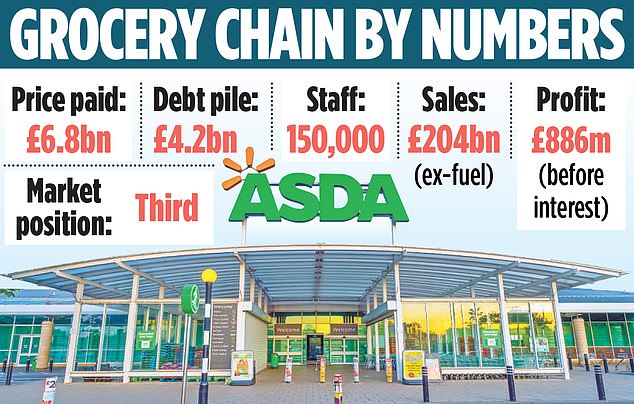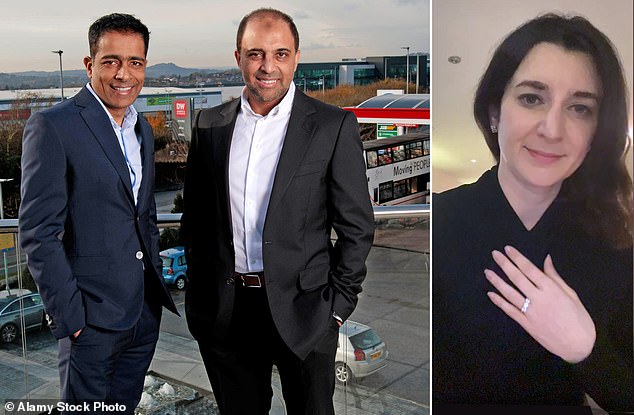Romance and business are a combustible mix for top executives. None more so than the relationship between Mohsin Issa, the billionaire Asda tycoon, and prominent accountant Victoria Price, a powerful figure in her own right.
Professional networking site LinkedIn is often a place to promote professional achievements, rather than personal milestones.
But discerning followers of Price, one of the UK’s leading tax experts, would have noticed a video posted last year of her wearing a chunky diamond engagement ring.
Their romance – which has been a poorly hidden secret in the City for months – has renewed speculation about the future of Britain’s third-largest supermarket chain.
The engaged couple finally went public with their involvement last week. The announcement raises multiple questions about the future of Britain’s third largest supermarket, which is more than £4 billion in debt.
Power Play: The relationship between brothers Mohsin and Zuber has been complicated by Mohsin’s engagement to accountant Victoria Price.
The ring shown on LinkedIn, said to be worth £50,000, is for “everyday” use only. Price’s “real” rock is said to have cost a staggering £1 million.
As a self-made billionaire, such expensive baubles are well within Mohsin’s reach. But his engagement to Price, a former tax partner at EY, the grocer’s former auditors, has deepened the rift between Mohsin and his younger brother and business partner Zuber, who reportedly wants out of Asda.
The brothers shocked the city when they bought the supermarket giant in a controversial deal fueled by £6.8bn debt three years ago.
Asda has been struggling under the Issas’ leadership, losing market share to German discount chains Aldi and Lidl.
Meanwhile, rising interest rates have increased Asda’s debt load.
The chain has been without a CEO for 18 months, leaving Mohsin in charge. MPs have criticized him for his lack of experience in retail and his inability to answer simple questions about Asda’s finances.
Reports in the Sunday Telegraph suggested that Zuber is trying to sell his 22.5 per cent stake in Asda so he can focus on EG Group, the former EuroGarages petrol retail empire that is the basis of Mr Zuber’s estimated £5bn fortune. Brothers.
One potential buyer is private equity group TDR Capital, which already co-owns Asda and EG Group with the Issas. TDR declined to comment.
So where does all this leave Asda? It is understood the couple met in 2016, two years before Price presented the Issas with the Entrepreneur of the Year award sponsored by EY, where she was a tax partner.
The affair was “slow,” according to a friend of hers, in part because they were both married at the time.
Things started to get more serious in 2022 when Price divorced her second husband, citing “irreconcilable differences.”
At that time the Issas had bought Asda, whose auditors were EY.
The fact that Price was a tax partner at a firm that audited Asda’s accounts, while romantically involved with a director of the same audit client, raised red flags at the Big Four accounting firm.
Price had to explain why he took his children to the British Grand Prix at Silverstone in July 2022 when tickets cost more than the £100 gift limit for EY partners.
Asda declined to comment, but a source close to the company insisted Asda does not pay for hospitality of any kind.
Price also had to reveal to EY that his eldest son, now 23, worked as a supervisor at the local Asda store in Deeside in 2022.
A source close to Asda said: “All colleagues, without exception, were put through Asda’s normal recruitment procedures and hired in accordance with them.”
It is also understood Price worked as a tax adviser to Mohsin and the Issa family while at EY.
He became a familiar face in the Blackburn complex, where he lived with his wife Shamima, Zuber and the brothers’ parents, Vali Issa and Zubeda Ali. Locals nicknamed the neighboring mansions the “five ugly sisters.”
Price’s lawyers insist she never worked in the Asda business, was not a personal tax adviser and disclosed her relationship with Mohsin to EY “from the beginning”.
The law firm added: “EY has confirmed to him that he complied with all of his obligations and made all appropriate disclosures to the firm’s ethics and compliance teams throughout his career.”
EY declined to comment.

What is not disputed is that EY resigned from auditing Asda the day before Price left the company, saying he resigned by mutual consent following Asda’s acquisition of EG’s UK service station business, and due to the “scheduling requirements” of the audit.
Price has since taken on a senior tax role at management consultancy Alvarez & Marsal.
Opinions about the Issas are divided. Some say they got lucky – and got rich – by using other people’s money in an era of cheap debt.
“They’re a bit Marmite, but I think the ‘Chancer’ label is unfair,” said retail expert Richard Hyman.
“Opportunists don’t invest in a business like they do when everyone is talking about cutting costs.”
Others question Asda’s business model. Under Mohsin’s leadership, the grocer has gone “all in” on petrol and convenience retail, racking up more debt on Asda’s balance sheet in the process.
It’s a business he and Zuber know intimately and one in which Asda is expanding rapidly. Asda has acquired hundreds of sites from the Co-op and, more recently, EG Group, increasing its debt.
These outlets are being converted into convenience stores with connected fuel pumps and rebranded as Asda Express. “Whatever you say about them, they are not asset strippers,” Hyman said.
Rival grocer Morrison has taken a different route. He has just sold his 337 fuel service stations and more than 400 adjacent sites to Motor Fuel Group in a £2.5 deal to help reduce his debt. Morrison chairman and retail veteran Sir Terry Leahy said forecourt retail was best left to specialists like MFG.
Asda can raise cash to pay down its debt by selling and renting out its store space, of which it is 70 per cent wholly owned, one of the highest in the sector, Hyman added.
And despite concerns about Mohsin’s ability to run the supermarket chain, he has assembled a strong retail team around him, including Liz Evans, who runs George, and Tesco’s Kris Comerford.
For businessman Tom Beahon, the Issas are “role models.” With his brother Phil he co-founded the sportswear brand Castore. Beahon told The Mail on Sunday: “They invested in us and instilled in us the ambition to shoot for the stars.”
A recent fundraising valued Castore at £950 million. It means that the Issas, who were the largest external shareholders, have made another fortune.
Will this Midas touch (and brotherly love) prevail in his business empire? Only time will tell.
Some links in this article may be affiliate links. If you click on them, we may earn a small commission. That helps us fund This Is Money and keep it free to use. We do not write articles to promote products. We do not allow any commercial relationship to affect our editorial independence.

